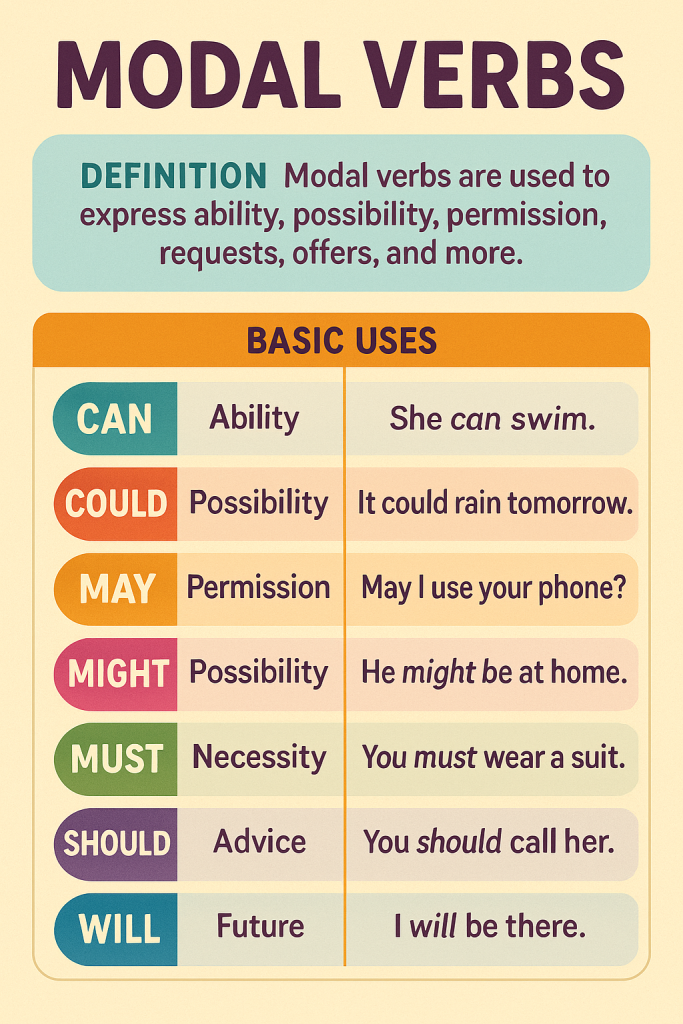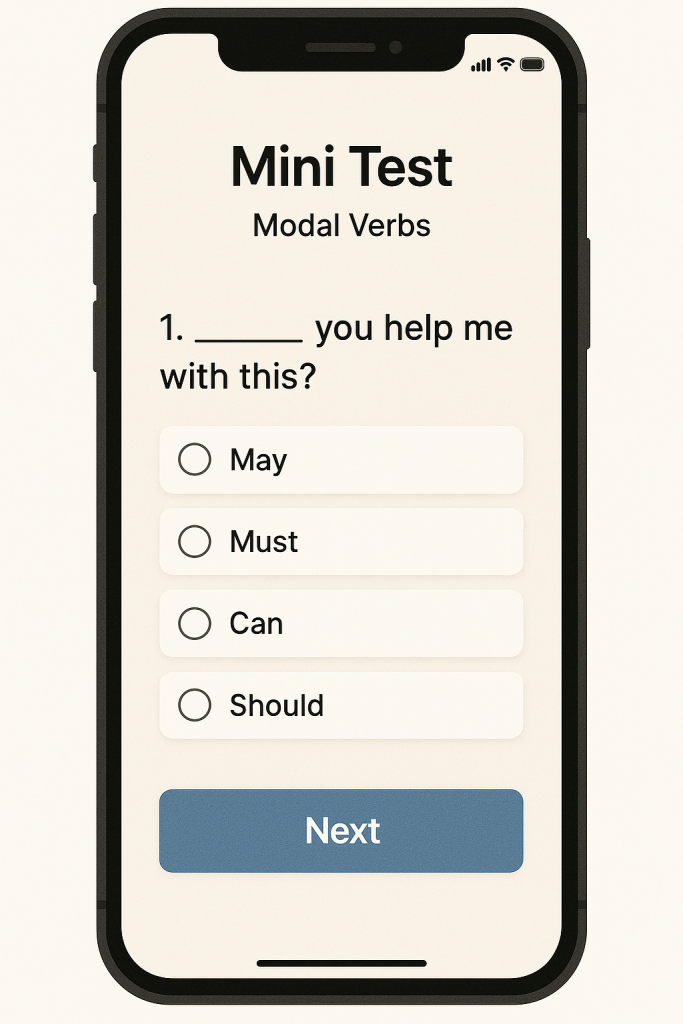Introduction: Why Modal Verbs Might Just Ruin Your Day
Let’s say you ask your friend,
“Can you help me move this weekend?”
And they respond with:
“I could… if I wanted to.”
Welcome to the thrilling world of modal verbs — where meaning changes faster than your Wi-Fi connection and every little word holds just enough power to confuse even native speakers. These verbs are small, but oh-so-sassy. They express ability, possibility, permission, and necessity—and often leave English learners asking, “Wait, what did you just say?”
If you’re still struggling with sentence structure in general, you might want to check out this helpful guide on simple sentences in English before continuing. Modal verbs won’t make sense if your base is still made of cardboard.
What Are Modal Verbs in English?

Modal verbs are like grammar’s drama queens. They never show up alone (they always need a base verb), they don’t change form, and they absolutely refuse to be used with “to” (except “ought to,” which is the black sheep of the family we’re ignoring today).
We’ll focus on:
- Can
- Could
- May
- Might
- Must
- Should
Each of these plays a unique role in expressing things like permission, advice, or obligation—sometimes subtly, sometimes like a foghorn.
How to Use “Can” and “Could” — And Why People Get It Wrong
Used for ability and informal permission.
- Ability: I can speak Spanish.
- Permission: Can I go to the party? (Spoiler: “may” is more polite.)
Still getting your tenses mixed up? Revisit the Simple Present Tense guide to ground yourself in how verb timing works.
Could
“Could” is basically “can” with a top hat.
- Past ability: I could play piano when I was five.
- Polite requests: Could you open the window?
If this is starting to feel like a game of telephone, don’t worry. For even more confusing fun, have a look at reported speech rules, which love modal verbs like “could” and “would.”
“May” vs “Might”: What’s the Actual Difference?
“May” is the queen of formal permission.
- May I ask you a question?
- It may rain later.
Not sure how this differs from “might”? Neither is the weather forecast. But just like in English prepositions, nuance matters.
Might
This one’s the wishy-washy cousin of “may.” Use it when you’re unsure.
- I might go to the party.
- He might call later.
Want to see how uncertainty plays out in future plans? Visit the Simple Future Tense article to see how modal verbs like “might” and “will” interact.
“Must” vs “Should”: Is It Advice or a Threat?
If “should” is advice, “must” is non-negotiable.
- You must wear a seatbelt.
- She must be tired. (Deduction, not command.)
Think of it as the grammar version of a seatbelt law. It’s that serious.
Should
“Should” is what your conscience says before you ignore it.
- You should study.
- You should apologize.
Fun fact: a lot of native speakers mix up “must” and “should,” just like they mess up verbs ending in -s. So don’t feel bad. You’re part of a very large, confused club.
| Modal Verb | Main Use | Example | Formality Level |
|---|---|---|---|
| Can | Ability / Permission | I can swim. / Can I go? | Informal |
| Could | Past ability / Polite | I could help. | Polite |
| May | Permission / Possibility | May I come? / It may rain. | Formal |
| Might | Possibility | I might join. | Neutral |
| Must | Necessity / Deduction | You must stop. | Strong / Formal |
| Should | Advice / Expectation | You should study. | Neutral |
Mini Quiz: Can You Handle the Modals?

- You ___ finish your project by Friday.
- I ___ go to the beach if the weather improves.
- ___ I use your phone?
(Answers: must, might, may)
Practical Tips
- Watch English shows and listen for modals.
- Read example-rich articles like this one on conditional sentences where modal verbs often sneak in.
- Use trusted references like the Oxford Learner’s Dictionary when in doubt.
Conclusion: Modal Verbs Deserve Your Respect
Congratulations, you’ve survived. You now know how to use “can” without sounding like a toddler and “must” without starting a dictatorship. Remember, even experienced speakers mess up sometimes. That’s why we write helpful things like this blog and comma guides for professional emails—so we can pretend we know what we’re doing.
Want more delightful grammar content delivered straight into your tired eyeballs? Share this article, leave a comment about your most confusing modal moment, and subscribe for more grammar that doesn’t suck.
✅ FAQ (SEO ve kullanıcı dostu)
❓What is a modal verb in English?
A modal verb helps express ability, possibility, permission, or necessity. Words like “can,” “could,” “must,” and “might” are all modal verbs. They’re like mood-setting sidekicks in a sentence.
❓What’s the difference between “can” and “could”?
“Can” is used for present ability or permission, while “could” is more polite or refers to past ability. For example, “I can swim” vs “I could swim when I was five.”
❓When do we use “may” and “might”?
Both suggest possibility, but “may” is slightly more formal. “It may rain” and “It might rain” are both correct. Meteorologists use both and still get it wrong.
❓Is “must” stronger than “should”?
Yes. “Must” is a command or strong necessity. “Should” is more like advice your future self will ignore.
❓Can modal verbs be used alone?
Nope. Modal verbs always need a base verb. You can’t say “I musted” or “She canning.” Unless you want English to cry.
